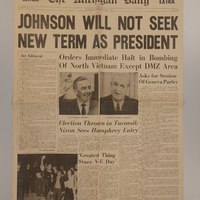Control the Conversation
In order to win large audiences over to their cause, collective efforts must find ways to undermine the strength of those opponents who presently control the terms of fraught conversations. The Student Peace Union's "Modern Dictionary Supplement" nicely illustrates the importance of this action by seeking to reveal, from their perspective, the ugly truths lurking behind the uncritical invocation of such ostensibly innocuous phrases as "pacify" and "internationalism" in the context of American foreign policy toward Vietnam.
While weakening the discursive power of opponents by tugging at their veil of objectivity, activists must also make efforts to control the conversation in their own right. Often, doing so involves taking pains not to alienate those outside of a given movement, but instead to meet them where they are and win their support from there. Many young activists attempted just that in their campaigning for antiwar candidate Eugene McCarthy -- who ran for the Democratic presidential nomination in 1968 -- by shaving their beards and cutting their hair to "get clean for Gene" while working in neighborhoods around the country for the Minnesota senator's presidential bid (Pugmire 2006).

